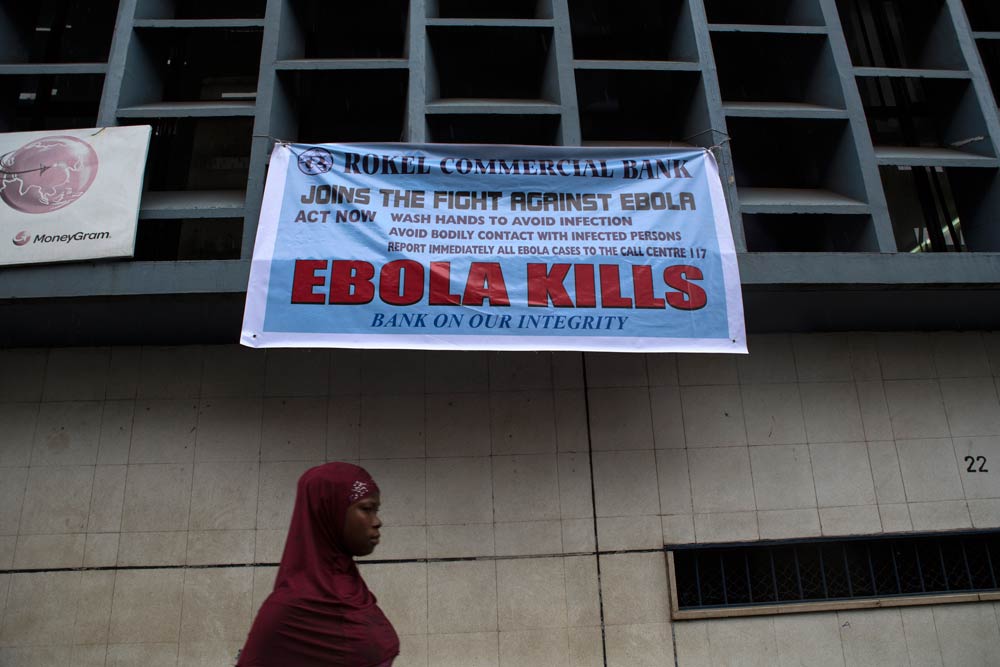
Upon landing at Kigali International Airport last month, I peered out the window and my eyes caught sight of an official clad in protective gear standing just under a sign that read ‘Arrivals: Ebola testing’. If I had ever been removed from what has been going on in my beloved Sierra Leone, it ended in this moment. Before my flight from Washington, I was informed that we would be screened upon arrival. And there it was. Even from the window of seat 16K, I could see the measures that had been put in place to protect the citizens of the country.
After disembarking the plane and entering the airport, we stood in a queue for about 10 minutes. I noticed a form that other passengers were filling out. I asked the young lady behind me if it was for everyone. She responded “Yes,” so I moved to the counter to complete mine. It asked: “In the past three weeks have you been in the following countries: Sierra Leone, Guinea, Liberia, Nigeria, Senegal?” At that moment I felt a sense of solidarity first with Sierra Leoneans near and far, because sadly this too has become one of our realities. I also felt isolation because my entry, identity and existence were being sanctioned and questioned by a customs form. A customs form at which other travellers would not cringe; they don’t have blood from Sierra Leone, Liberia and Guinea. Even if I don’t explain to you what happened next, you would still be able to surmise what would occur naturally as a Sierra Leonean-American woman with Sierra Leonean entry and departure stamps in her US passport. As I continued filling out the form, I checked “No” on the form because the truth was I hadn’t been to Sierra Leone in the past three weeks.
I calculated: three weeks equals 21 days. Twenty one is the magic number that many African countries and people all over the world will use to promote the stigmatisation of people from Ebola-hit countries, or with any relations to them. It’s the number that would decide your fate when attempting to enter another country. It takes up to 21 days for the deadly Ebola virus to manifest itself in symptoms after one has been exposed. The incubation period, they call it.
No, I haven’t been in Sierra Leone in the past 21 days. Not physically. But in the past 21 days, my thoughts have been there. My mind has raced incessantly and my heart has jumped at the numbers. My soul has cringed at flaws that have been illustrated by this epidemic in Sierra Leone. For more than 21 days, I have certainly felt helpless.
But this customs officer didn’t exactly know how I or other Sierra Leoneans have felt for the past few months. As he attempted to look for a clear page to add the Rwanda entry stamp, he came across my Sierra Leonean visa page. He glanced at my passport and the stamps for my entries to Sierra Leone, the most recent being December 2013 to January 2014. I watched his eyes widen slightly as he turned the pages and I anticipated the questioning. It took a while for him to gather his thoughts and ask the question. “Are you coming from the United States?” Obviously, I thought to myself. “When last have you traveled to Sierra Leone?” Didn’t you already see the stamps? “What was the last date you left Sierra Leone?” I responded “January 10, 2014. And when I left, this wasn’t a problem”.
Some countries have banned the entry of citizens and passengers arriving from Sierra Leone, Guinea and Liberia – nations that have been hit the hardest by the latest Ebola outbreak. I understand caution but paranoia and, consequently, stigmatisation, are not the cures to this disease. To see a Sierra Leonean visa in my passport evidently put the official on high alert. The realisation that I could somehow be considered a ‘risk’ – not just to this man but to his country – despite the evidence before him made me feel small.
He stared at me a bit longer, as if trying to gauge whether the words I uttered were the truth. Then he asked me for my point of contact. I gave him that information. He made the decision not to call or do whatever he had considering doing. I smiled because even in the face of this ugly stigma and the horror that we know as Ebola in Sierra Leone, I am still proudly a “Salone Titi.” I thanked him, retrieved my passport, and rolled my hand luggage to begin my experience as a Sierra Leonean-American woman in Rwanda.
Bintu Musa is a globetrotting educator and writer. She is currently lecturing at Rwanda Tourism University College as a Fulbright Scholar. She blogs at Bee’s Backseat.
